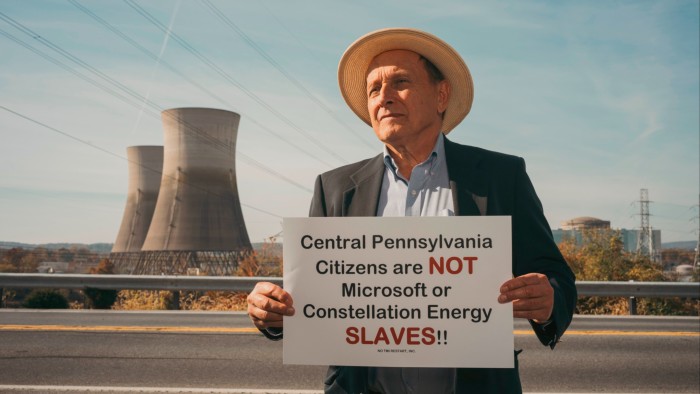A group of veteran community activists is planning legal action to block the reopening of Three Mile Island nuclear plant in a test of whether the American public will back an atomic energy boom financed by Big Tech and US taxpayers.
Three Mile Island Alert, a group founded almost half a century ago to lobby for the closure of the plant in Middletown, Pennsylvania — site of the worst nuclear accident in US history — said it would challenge government licences required by operator Constellation Energy, which is targeting a restart in 2028.
The legal threat is one of several obstacles facing the utility as it races to meet the terms of a 20-year power supply deal struck with Microsoft. The $1.6bn project could become a potent symbol of the revival of nuclear energy in the US.
Constellation must obtain numerous regulatory approvals, train hundreds of staff and upgrade equipment at a time when nuclear supply chains are stretched. It must also persuade the local community — and the incoming administration of Donald Trump — that the benefits of restarting the plant outweigh the risks.
“The restart is not going to happen by 2028: that is pure fantasy,” Eric Epstein, a 64-year old former history professor and chair of TMI Alert, told the Financial Times.
“We haven’t even cleaned up Three Mile Island unit two, the site of the accident is still highly radioactive . . . and now we’re going to generate more nuclear waste. It’s disappointing and it’s manifestly unfair.”

TMI’s second reactor was closed in 1979 after a partial meltdown caused a radiation leak, prompting a chaotic response from then operator Metropolitan Edison Company and public authorities that dented public trust. The plant’s first reactor was shuttered in 2019 for economic reasons when the US shale revolution produced so much cheap gas that nuclear energy could not compete.
But a surge in power demand from data centres, reshoring of manufacturing and electrification of transport, which is forecast to double electricity demand growth over the next decade, is fuelling a nuclear investment boom.
Big Tech and the Biden administration are backing atomic energy to deliver the type of reliable 24-7, emissions-free power they insist is needed to ensure America maintains its lead in artificial intelligence technologies.
In September, Holtec International secured a $1.5bn federal loan to help fund the restart in 2025 of the Palisades nuclear power plant in Michigan, which was mothballed in 2022. Last month, Google and Amazon signed deals with companies building small modular reactors, a new generation of nuclear technology seen as less risky to build than large scale reactors.
The US Department of Energy is reviewing $65bn in loan requests from companies seeking to build new reactors. Constellation is considering seeking a $1.6bn federal loan guarantee to help it finance TMI’s restart.
NextEra, another US utility, is considering restarting a nuclear plant in Iowa, which shut in 2020.
But it is the high prices for emissions-free electricity that Big Tech are willing to pay to meet climate goals that analysts say could sustain the revival of a sector, which appeared to be in terminal decline following the 2011 Fukushima disaster in Japan.
Microsoft is paying between $110 and $115 per MWh for electricity under the 20-year power supply deal agreed with Constellation, according to Jefferies. The investment bank said this was roughly double the price of standard power deals in the region.
“The demand for carbon-free electricity is growing and there are people who recognise the warming climate is a real challenge and they are willing to pay to bring projects like this back to life to help reduce their own carbon footprint,” said Bryan Hanson, Constellation’s chief generation officer, who is managing TMI’s restart.


During a tour of TMI, Hanson, a 37-year industry veteran, insisted the company could avoid the delays and cost overruns that have blighted recent nuclear projects in western countries.
The gigantic cooling towers that once played a critical role in TMI’s nuclear operations are now overgrown with grass and in need of refurbishment.
The control room that operators once used to run reactor number 1, which generates enough electricity to power 800,000 homes, is a throwback to the 1970s with hundreds of levers and dials and barely a sign of the digital technologies common in modern power plants.
But Hanson said most of the upgrades required for a restart are routine maintenance apart from the replacement of the main power transformer at the plant, which has already been ordered at a cost of $100mn.
“Not an ounce of concrete needs to be poured, not one piece of rebar needs to be tied and not one cable needs to be pulled: the infrastructure is here,” said Hanson.
Safety will be paramount when regulators make a final determination on the restart, particularly given the partial meltdown that occurred at reactor number two due to technical malfunctions and human error in 1979.
The site, which is located 300 metres away from reactor one, is now owned by a separate company, Energy Solutions, which plans to clean up and decommission the reactor by 2052.
“The 1979 accident taught us that our standards weren’t right at the time,” says Hanson, adding that safety standards are now recognised as the best in the world.

Constellation’s assurances mean little to Patricia Longenecker, an 81-year old anti-nuclear activist who lives about 3 miles from TMI and has protested against the plant ever since the accident in 1979.
“It was like a punch in the gut,” said Longenecker when asked how she felt when Constellation announced in September its plans to reopen TMI. “I felt betrayed that officials and our government representatives would even encourage this when there are other options.”
Longenecker was one of more than 140,000 people who evacuated their homes in the aftermath of the accident. She believes the industry continues to prioritise profit over safety and notes that the US still does not have a permanent nuclear waste disposal site. This means dozens of barrels of highly radioactive spent fuel continue to be stored on site at TMI, she said.

Constellation cites a survey it commissioned showing 57 per cent of Pennsylvania voters backed reopening TM1. The plant would create more than 600 permanent jobs and contribute $3.6bn a year in taxes, according to the company.
Trade unions and local businesses support the reopening. “We are super excited about getting those middle class jobs,” said Joe Gusler of the Pennsylvania State Building Trades, whose father helped build TMI.
“Sure, there was an incident, but everybody needs to remember that incident was in unit two, and that unit never ran again.”
But numerous regulatory hurdles remain before TMI can restart — a point highlighted when federal regulators last week surprisingly rejected a grid interconnection request for an Amazon Web Services data centre at the site of Talen Energy Corp’s Susquehanna nuclear power plant.
The regulator was concerned that diverting large amounts of power from the regional grid to service the data centre could undermine the stability of supply and increase power bills for consumers.
Constellation insists the Talen-Amazon decision has no impact on TMI’s deal with Microsoft, as the TMI reactor restart brings extra power on to the grid. The company also has powerful allies, including Josh Shapiro, Pennsylvania’s governor, who in September asked regulators to fast track TMI’s interconnection to the grid.
Constellation’s Hanson is confident the company can meet Microsoft’s tight timetable for getting access to power for its growing data centre fleet.
“2028 is doable,” he said. “The challenge of delays, you know, I just don’t see it. I don’t.”
Source link









